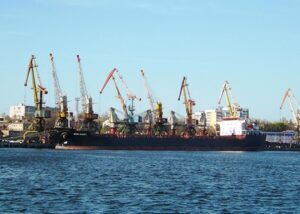
The State Property Fund (SPF) has prepared the privatization of the Ust-Dunaysk Commercial Seaport, which will be the first sale of the seaport since Ukraine’s independence, the SPF website reported on Thursday.
According to the report, the auction will be held on January 17 at Prozorro.sale. The starting price of 60 million UAH.
“This year, Ust-Dunaysk began to play a crucial role in global food security. (…) It has great potential for the development of Ukrainian food exports. This requires investments that private business can bring,” commented Rustem Umerov, head of the Fund.
The State Property Fund noted that since the beginning of the port operation in war conditions it has transshipped 153 thousand tons of grain for export. In addition, Ust-Dunaisk handles imported cargo, such as salt and rice.
Since April 1, the port has handled 58.3 thousand tons of imported consumer goods.
At the same time in January-September 2022 Ust-Dunaisk received 848 thousand UAH of net profit. In January-November, it paid more than 9 million UAH of taxes to the budgets of all levels.
The port itself consists of three assets: a port in Vilkovo, Odessa region, port point “Kilia” in the city of the same name and a base of service of special ships lighter carriers on the island of Shabash.
Direct loading-unloading operations are carried out in port point Kiliya, located at 54th km of the Danube River. Passport depths at the pier – 3 meters, actual – 1.5 meters.
As reported, on November 11, the Cabinet of Ministers of Ukraine decided to expand the water area of three seaports on the Danube: the port in Izmail, Reni and the port of Ust-Dunaisk.
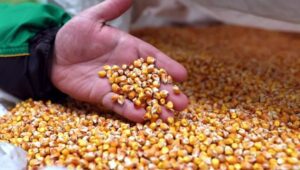
Four dry cargo ships with more than 120,000 tons of wheat and corn left Ukrainian ports on Friday, the Joint Coordination Center (JCC) reported.
“Four ships left Ukrainian ports today, they are carrying a total of 120,150 tons of grain and other food within the framework of the Black Sea Grain Initiative,” the report said.
Vessel Nestor S will deliver 62,9 thousand tons of corn to China, dry-cargo carrier Mohamad M will carry 23,5 thousand tons of corn to Italy. In addition two vessels Tzarevich (19 thousand tons of wheat) and Gannet S (14 750 tons of corn) set a course to Turkey.
In addition, there are five ships heading for Ukrainian ports, which passed through the humanitarian sea corridor on November 11.
SKC notes that 76 dry cargo vessels are awaiting permission to enter Ukrainian ports, and seven loaded vessels are preparing to be inspected in Turkish territorial waters.
“As of November 11, the total tonnage of grain and other agricultural products exported from three Ukrainian ports is 10,288,535 tons. A total of 892 ships have been allowed to move so far: 450 to arrive at Ukrainian ports and 442 to leave them,” stressed the JCC.
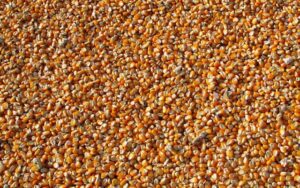
A trial train of 21 wagons with 1.2 thousand tons of feed corn has arrived in the port of Rostock (Germany), and soon three more trains with corn from Ukraine will enter the country, according to the website of the German publication NRD.
According to him, the train with corn was on the road for about eight days, which included reloading agricultural products into narrow-gauge wagons at the Ukrainian-Polish border, after which DB Cargo delivered the cargo to Rostock, where agricultural products were reloaded into port granaries. The publication clarifies that last year’s corn crop is in good condition.
It is specified that BAT Agrar from Ratzeburg (Germany) is coordinating the arrival of trains. It is not yet known where the agricultural products that arrived at the port of Rostock will go next.
“Due to Russia’s aggressive war in Ukraine, many export routes of local agriculture have become difficult or impossible. However, in accordance with the agreement, exports across the Black Sea have started again this month,” the publication recalled.
As reported, in April, the German concern Deutsche Bahn and its subsidiary logistics company DB Cargo began redirecting grain exports from Ukraine through the railway infrastructure instead of their traditional export through Ukrainian seaports, which were blocked by the Russian fleet at that time.
Michael Theurer, parliamentary secretary at the German Federal Ministry of Transport, said that Germany is obliged to ensure the shipment of 20 million tons of grain from Ukraine to prevent starvation on the planet.
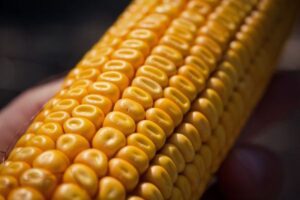
The Turkish vessel Polarnet, which left the port of Chornomorsk (Odessa region) on August 5 with 12,000 tons of corn from the Kernel agricultural holding, arrived at the Turkish port of Derince on August 8.
Kernel completed one of the most important missions – the first ship with Ukrainian grain arrived at its destination. The shipment was carried out as part of the initiative for the safe transportation of grain and food from Ukrainian ports,” the group of companies wrote on Facebook on Tuesday.
It is specified that the ship was loaded with corn at the Transbulkterminal grain terminal in Chornomorsk, which is part of Kernel. In the 2020/2021 marketing year (MY, July-June), the terminal handled 7.6 million tons of grain crops, which is 22% more than in MY 2019/2020, and became the largest in the country in terms of transshipment of agricultural products.
Agropromholding emphasized that Ukrainian agricultural exporters remain key suppliers of foreign exchange earnings to Ukraine, which is an important positive factor for the economy of the warring country.
“If we manage to maintain the trend and increase exports, farmers will not have to reduce the area under crops, and Ukraine will feel a deficit in state budget revenues,” Kernel summed up in the message.
Before the war, Kernel ranked first in the world in the production of sunflower oil (about 7% of world production) and its export (about 12%), and was also the largest producer and seller of bottled sunflower oil in Ukraine. In addition, the company was engaged in the cultivation of other agricultural products and their sale.
Its largest co-owner through Namsen Ltd. is Ukrainian businessman Andrey Verevsky with a share of 41.3%.
The agricultural holding in fiscal year 2021 (FY, July 2020 – June 2021), increased its net profit by 4.3 times compared to FY 2020 – up to $513 million, its EBITDA increased 2.1 times – up to $929 million, revenue – by 38%, to $5.65 billion.
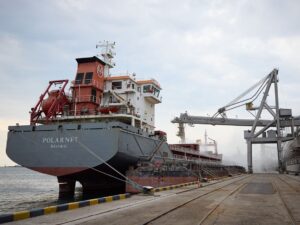
The Ministry of Infrastructure announced the departure of the first ship with 26,000 tons of Ukrainian corn from the sea trade port “Odessa”.
“The first ship with Ukrainian food left the port of Odessa,” Minister of Infrastructure of Ukraine Oleksandr Kubrakov wrote on his Facebook page.
Earlier, People’s Deputy of Ukraine (European Solidarity faction) Oleksiy Goncharenko in his telegram channel said that the first caravan of 16 dry cargo ships with grain from Ukraine would arrive in Turkey on August 3 this year.
As reported, on July 29, the ambassadors of the G7 countries in Ukraine arrived in Odessa to check the launch of the “grain corridor”.
On July 22, under the auspices of the UN, Ukraine and Turkey signed an agreement in Istanbul on the resumption of the safe export of Ukrainian grain across the Black Sea.
On the morning of July 23, Russian invaders attacked the Odessa Commercial Sea Port with Caliber cruise missiles. The Ukrainian Foreign Ministry said that the Russian Federation, with a missile attack on the port, questioned the agreements it had given to the UN and Turkey in the “grain” agreement. The UN chief unequivocally condemned reports of air strikes on Odessa, citing the commitments made by the parties at the signing ceremony in Istanbul.
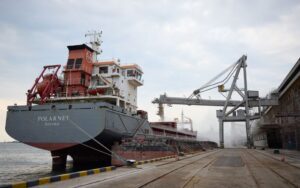
The first ships with Ukrainian grain are being loaded in the ports of the Odessa region, which have been blocked in Ukrainian waters since the beginning of the war, said Deputy Head of the President’s Office Kyrylo Tymoshenko.
“There are 17 ships in the ports with almost 600,000 tons of cargo. Of these, 16 ships with Ukrainian grain with a total tonnage of about 580,000 tons, which will soon leave for ports of destination,” he wrote on his Telegram channel on Friday.
Tymoshenko also stressed that as a result of the armed aggression of the Russian Federation on the territory of the Odessa region, 416 buildings and structures were destroyed or partially damaged.
As reported, on July 29, the ambassadors of the G7 countries in Ukraine arrived in Odessa to check the launch of the grain corridor.
On July 22, under the auspices of the UN, Ukraine and Turkey signed an agreement in Istanbul on the resumption of the safe export of Ukrainian grain across the Black Sea.